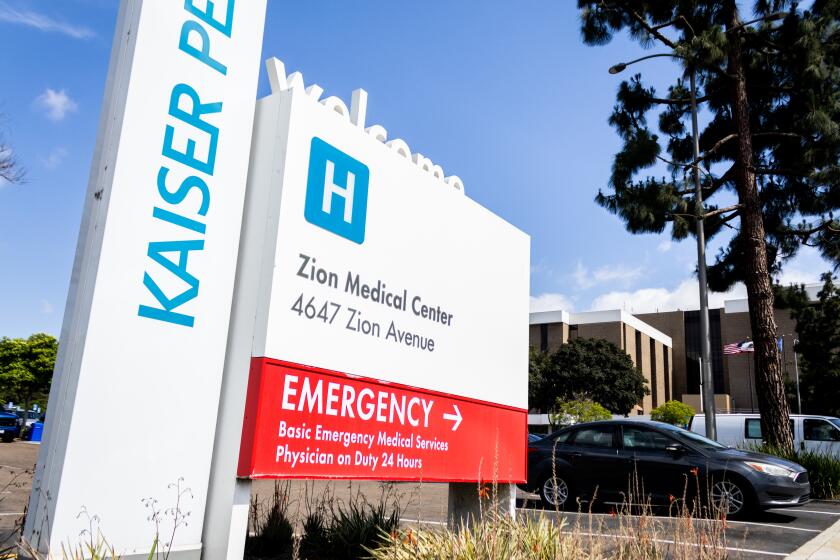Covered CA director urges enrollees to ignore Trump-caused uncertainty
Covered California, the state’s health insurance exchange, is at a crossroads brought about by President-elect Donald Trump’s vow to repeal at least parts of the Affordable Care Act.
Obamacare pays income-based subsidies to 87 percent of the 1.3 million Californians currently covered by plans sold through the exchange. Elimination of those payments could very well lead to mass cancellations by consumers no longer able to afford their insurance policies.
Amid this potential turmoil, Covered California executive director Peter Lee arrived in San Diego to kick off a statewide promotional tour aimed at getting Californians to renew their policies or sign up if they haven’t enrolled in previous years.
On Friday, a day before the tour was scheduled to start, Lee sat down with The San Diego Union-Tribune to discuss the present standing and potential future of the law that has extended health insurance to about 20 million Americans — as well as Covered California’s slice of that picture.
The following is an edited version of his conversation.
Question: How has your organization prepared for the possibility of major changes to the Affordable Care Act in 2017?
Answer: We always recognized that we can’t predict what’s going to happen in the election, so we did modeling to say, for example, if subsidies went from 400 percent of (the federal poverty income level) to 250 percent of poverty, what happens? What would happen is … about 300,000 Californians would be without insurance. We also modeled what happens if the subsidies are eliminated. If that happens, we lose 1.3 million people. Our raison d’etre goes away without the subsidies, and there would be 1.3 million people back on the rolls of the uninsured.
Question: What would you say to those who decide not to renew their coverage or not enroll for the first time because they’re worried about a repeal?
Answer: To me, it really is like talking about the theoretical possibility that a comet will hit Earth tomorrow. There are endless possibilities, but some of them can be cuckoo. Yes, the president-elect has said “we want to repeal and replace the Affordable Care Act,” but we’ve also heard him say he wants to make sure all Americans have health coverage, he doesn’t want to pull things out by the roots, he wants to ensure that people who have pre-existing medical conditions will maintain their coverage.
Hundreds of health plans around the nation have signed contracts for terms of engagement for 2017. The idea that they would just pull the rug out from under 22 million people, to me, just doesn’t pass the smell test. We want Californians to take a deep breath, get the benefits the law provides. And we can and should be part of the policy debates that will take time.
We’re focused on the here and now — getting people enrolled. Big change does not happen overnight, but what does happen overnight is people can get hit by a car, people can get cancer. Does it make sense to make sure that we spend money to let people know they can get insurance now, while they can, at good subsidized rates? Absolutely.
Question: Do you see a path forward for Covered California if whatever new version of the Affordable Care Act no longer relies on health exchanges or no longer grants subsidies?
Answer: It’s too soon to say. Premium subsidies are central to how we help people get coverage they couldn’t afford otherwise. If the nature of the subsidies is dramatically different, we will be dramatically different. We’ve got time to figure that out. I hope that President-elect Trump and the new Congress will say, “Yeah, many people need subsidies. Health care in America is too expensive for many people to have it without financial help.” Separate from subsidies, though, is the fact that health care in America costs too much. We need to look at pharmaceutical costs. We need to look at waste, which is incredible. We need to look at changing how care delivery is done.
Question: Covered California has been innovative in some aspects of its operations, including its decision to be an active purchaser of insurance coverage on behalf of Californians. What do you think policymakers in Washington, D.C., should understand as they consider revisions to Obamacare?
Answer: We think some of the lessons we’ve learned in California are worthwhile to share with the new Congress and the new administration. The national stories about health plans fleeing from exchanges are a good example. San Diego is a great example of what we’ve been able to accomplish. Here we have six health plans being offered and they’re big, brand-name plans with good networks and competitive prices. Some of those plans have bigger rate increases than others for next year. Some enrollees are seeing no increase while others might see 20 percent plus, but there are enough other options available that they can shop, they can change plans.
We think that what we have in California is a lesson for the nation in how you have a program where plans aren’t fleeing from exchanges but want to participate.
paul.sisson@sduniountribune.com
(619) 293-1850
Twitter: @paulsisson
Get Essential San Diego, weekday mornings
Get top headlines from the Union-Tribune in your inbox weekday mornings, including top news, local, sports, business, entertainment and opinion.
You may occasionally receive promotional content from the San Diego Union-Tribune.











